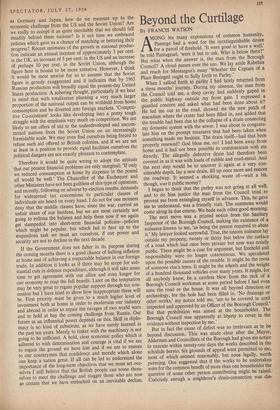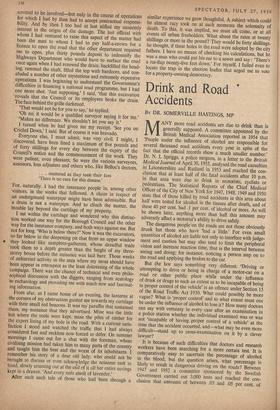Beyond the Curtilage
BY FRANCIS WATSON AMONG his many expressions of common humanity., Panurge had a word for the inextinguishable desire for a parcel of freehold. 'It were good to have a wall,' he told Pantagruel, 'were it but to ask, Who is below there?' But what when the answer is, the man from the Borough Council? A cloud passes over the sun. We lay aside Rabelais and reach for Montaigne's essay 'Whether the Captain of a Place Besieged ought to Sally forth to Parley.'
When I sallied forth to parley I had lately returned from a three months' journey. During my absence, the man from the Council told me, a deep cavity had suddenly gaped in the public highway outside my front gate. I expressed a guarded concern and asked what had been done about it? He led me out to the road, showed me the new patch of macadam where the crater had been filled in, and added that the trouble had been due to the collapse of a drain connecting my domestic system with the sewer. I was about to congratu- late him on the prompt measures that had been taken when something made me hesitate. The drain itself—had that been properly renewed? God bless me, no! I had been away from home and it had not been possible to communicate with me directly. The allegedly defective drain had therefore been covered in as it was with loads of rubble and road-metal. And the next step would be to uncover it again at a very con- siderable depth, lay a new drain, fill up once more and restore the roadway. It seemed a shocking waste of—wait a bit, though, was it public money?
I began to think that the parley was not going at all well, and to do him justice the man from the Council tried to prevent me from entangling myself in advance. This, he gave me to understand, was a friendly visit. The summons would come along in due course. We bade each other good morning.
The next move was a printed notice from the Sanitary Inspector of the Borough Council, making the existence of a nuisance known to me, 'as being the person required to abate it,' My lawyer looked sorrowful. True, the unseen nuisance lay outside my property, twenty or thirty feet below the surface of a road which had once been private but now was noisily public. There might be a case for argument, but freehold and responsibility were no longer coterminous. We speculated upon the possible causes of the trouble. It might be the roots of someone else's trees. It might be the wheels and the weight of a hundred thousand vehicles over many years. It might, for all anybody knew, be a careless blow from the pick of a Borough Council workman at some period before I had even seen the road or the house. It was all beyond detection or archeology, for the hole had been filled in. 'No drainage or other works,' my notice told me, 'are to be covered in until inspected and approved by an Officer of the Borough Council.' But that prohibition was aimed at the householder. The Borough Council was apparently at liberty to cover in the evidence without inspection by me. '
But in fact the cause of defect was so irrelevant as to be beyond discussion. This was made clear after the Mayor, Aldermen and Councillors of the Borough had given me notice to execute within twenty-one days the works described in the schedule hereto. Six grounds of appeal were permitted to me, most of which seemed reasonably, but none legally, worth pursuing. One suggested that if the works to be undertaken were for the common benefit of more than one householder the question of some other person contributing might be raised. Curiously enough a neighbour's drain-connection was dis- covered to be involved—but only in the course of operations for which I had by thea had to accept contractual responsi- bility. And by then I too had at last stifled my unseemly interest in the origin of the damage. The last official with whom I had ventured to raise this aspect of the matter had been the man to whom I had to pay half-a-crown for a licence to open the road that the other department required me to open, plus thirty pounds deposit to indemnify the Highways Department who would have to surface the road once again when I had renewed the drain, backfilled the head- ing, rammed the shaft, filled the top with hardcore, and con- cluded a number of other mysterious and extremely expensive operations. I was beginning to understand the Government's difficulties in financing a national road programme, but I had one more shot. 'Just supposing,' I said, 'that this excavation reveals that the Council or its employees broke the drain. The face behind the grille darkened.
'That would not be for you to say,' he replied. 'Oh no, it would be a qualified surveyor saying it for me.' 'Makes no difference. We shouldn't let you say it.'
I turned when he had given me my receipt. 'See you on Crichel Down,' I said. But of course it was bravado.
Everyone else, I must admit, was very civil. I might. I discovered, have been fined a maximum of five pounds and of forty shillings for every day between the expiry of the Council's notice and the commencement of the work. They were patient, even pleasant. So were the various surveyors, assessors, loss adjusters and others who, like Belloc's doctors, . . . muttered as they took their fees 'There is no cure for this disease.'
For, naturally. I had the insurance people in, among other visitors, in the weeks that followed. A claim in respect of an underground waterpipe might have been admissible. But a drain is not a waterpipe. And to clinch the matter, the trouble lay beyond the curtilage of my property.
I sat within the curtilage and wondered why this distinc- tion worked one way for the Borough Council and the other way for the insurance company, and both ways against me. But not for long. 'Who is below there?' Now it was the excavators, so far below in the deepening pit that from an upper window • they looked like samphire-gatherers, whose dreadful trade took them to a depth greater than the height of my three- storey house before the nuisance was laid bare. Those weeks of unhurried activity in the area where my moat should have been appear in retrospect as the least distressing of the whole campaign. There was the chance of technical and even philo- sophical discussion with the diggers, ranging from scatology to eschatology and providing me with much new and fascinat- ing information.
From afar, as I came home of an evening, the lanterns at the corners of my obstruction guided me towards my curtilage with their small red beacons. It was my paraffin that sustained them, my nuisance that they advertised. Mine was the little hut where the tools were kept, mine the piles of timber for the expert lining of my hole in the road. With a curious satis- faction I stood and watched the traffic that 1 had always considered fast and reckless now forced to defer. On summer mornings I came out for a chat with the foreman, whose civilising mission had taken him to many parts of the country and taught him the best and the worst of its inhabitants. 1 remember his story of a dear old lady, who could not be brought to discuss or even acknovyleclge the noisome task in hand, slowly counting out at the end of it all her entire savings kept in a drawer. 'And every note smelt of lavender.'
After each such tale of those who had been through a similar experience we grew thoughtful. A subject which could be almost racy took on at such moments the solemnity of death. To this, it was implied, we must all come, or at all events all urban freeholders. What about the rates at twenty shillings or more in the pound? They would be forty shillings, he thought, if these holes in the road were adopted by the city fathers. I have no means of checking his calculations, but he was a man who could put his ear to a sewer and say : 'There's a rat-flap twenty-five feet down.' For myself, I failed even to locate the trap in the election leaflet that urged me to vote for a property-owning democracy.



































 Previous page
Previous page